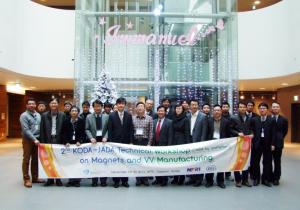Trilateral collaboration in the East
14 Jan 2014
-
Ji-min Song, ITER Korea
More than 30 technical officers from Japan, Korea and China were present at the second technical workshop that took place from 19 to 20 December on the ITER magnets and the vacuum vessel.
In December, the second technical workshop on the ITER magnets and vacuum vessel was held by the Japanese and Korean Domestic Agencies, with China in attendance. The workshop aimed to promote the sharing of technology and manufacturing experience for these critical ITER components and to tighten cooperation among three neighboring ITER Members for the successful implementation of ITER.
More than 30 technical officers were present at the two-day event, which took place on 19-20 December 2013 at the new headquarters of National Fusion Research Institute in Daejeon, Korea. Participants included the heads of Domestic Agencies Kijung Jung (Korea) and Eisuke Tada (Japan).
The discussions focused on the challenges of manufacturing the ITER magnets and vacuum vessel. Viewpoints and experience on such areas as safety requirements, codes and standards, welding deformation and qualification procedures (non-destructive examination, manufacture tolerances, the material properties of structures and jackets, and acceptance test requirements) were exchanged. The issues of quality, schedule and cost were also addressed during the workshop.
Participants reaffirmed the importance of having the Unique ITER team spirit flow down to the technical level for improved Project efficiency. Much can be learned from one another through close collaboration and exchange of lessons learned.


